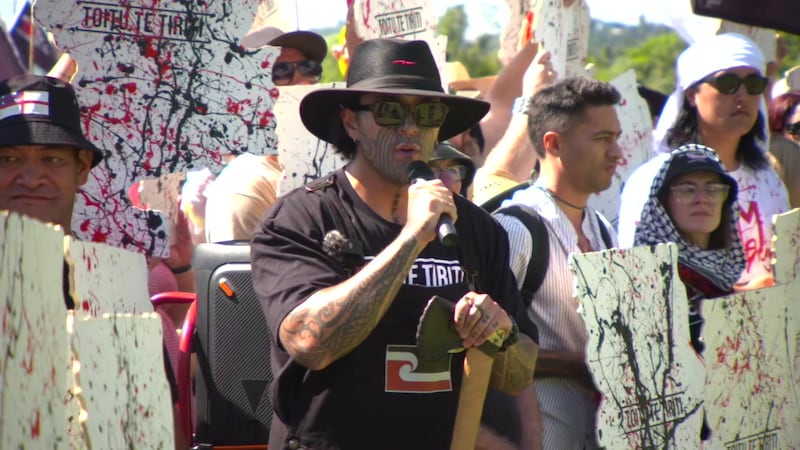Analysis: It is hard to overstate how damaging the past few weeks have been, not just for Te Pāti Māori but for Māori. The movement, supposed to represent a political resistance, has found itself imploding under the weight of internal accusations, leaks, and breaches of confidentiality. The so-called “reset” unveiled just days ago, aimed at restoring unity and focus, now feels redundant. Any attempt to rebuild trust will have to start again from scratch.
Late last night, Te Pāti Māori members received an email containing a series of documents with serious allegations against MP Mariameno Kapa-Kingi and her son, former party vice-president Eru Kapa-Kingi, in what the party described as a response to his recent public criticism of its leadership.
It would be naive to expect the circulation of confidential documents to a political membership email list to remain private. In response to the media from Parliamentary Services, the private nature of these documents was reinforced when the office explained it wouldn’t comment on “individual employment matters or internal party correspondence.”
Claims of violence and intimidation
The allegations are damning. In a three page letter from Parliamentary Services, the guard claims Kapa-Kingi was caught tailgating another person through the main entrance security gates on Budget Day in 2024, and he allegedly proceeded to use racist language, verbal abuse, threats of physical violence and intimidation - the guard accusing Kapa-Kingi used terms such as ‘You are just a piece of s..’, ‘F… you c..’, ‘Get f...ed’, ‘I will f…ing knock you out’, were used multiple times during this incident.
It is unclear who and for how long members of the party knew about the events that allegedly happened in May 2024.
The letter included in the documents circulated to membership do not include any record of Eru Kapa-Kingi’s version of events or how the issue was resolved.
Eru Kapa-Kingi has not addressed the allegations directly, instead posting a short statement on his socials, saying “...those who know us know there is no question of integrity, and we will continue to be side by side with our people.”
Beneath all of this, it is Māori who will be hurt the most. The issues our people face, such as poverty, housing, health, inequity, and the enduring impacts of colonisation, are too urgent for political infighting.
Throwing stones serves no one. Each leaked document and each accusation traded in public chips away at the collective movement that so many had placed hope in.
The current turmoil was triggered by Eru Kapa-Kingi, who earlier this month accused the party’s leadership of operating like a dictatorship. In an interview with Te Ao Māori News, he alleged that decisions were being made by a small group without consultation or transparency and that members who challenged that culture were sidelined or silenced.
Kapa-Kingi said the movement’s kaupapa had been overshadowed by “bullying tactics” and a style of leadership that prioritised control over accountability.
Those comments were followed by his announcement that Toitū Te Tiriti, which led last year’s historic Hīkoi mō te Tiriti, would formally distance itself from the party to keep its political ties unambiguous.
Since that story was published, Te Ao Māori News had been contacted by people who cited similar alleged experiences to Eru Kapa-Kingi; however, were too afraid to go on record in fear of some sort of retaliation.
As a result of fear of speaking out or sharing their story, from a news and legal perspective, we have been unable to corroborate such allegations to report.

It is understood that since he made these allegations, with no clear-cut evidence to back it up at the time, citing “they are stories for others to tell,” that a planned retaliation from the Party executive was incoming.
The documents circulated by Te Pāti Māori include a confidential Parliamentary Service report detailing an alleged incident on Budget Day 2024, and a separate letter warning Northland MP Mariameno Kapa-Kingi of a looming $133,000 overspend in her office budget.
The correspondence recommends drastic measures such as cutting staff, freezing travel, and halting contractor payments, including to her son, Eru Kapa-Kingi. The implication is that the situation had reached a point where the Speaker’s intervention was being considered. It is understood that those issues have since been resolved.
President John Tamihere’s urgent directive to address the “significant financial over-expenditure” reflects a party grappling not only with internal management but also with credibility. For a political movement that has prided itself on accountability and kaupapa Māori principles, this is an existential crisis.
A crisis of credibility: echoes of past Māori political fractures
This is not the first time a Māori political movement has faced such internal rupture. From the controversial split of five Māori electorate MPs in 1996 from NZ First to Mauri Pacific, to the collapse of Mana Motuhake in the early 2000s and a decade later, the fracturing of the Māori Party to Hone Harawira’s new waka, Mana, in 2011.
History shows how quickly kaupapa-driven politics can be undone by personality clashes and internal distrust.
Each time, the toll has been felt most by Māori voters who are left disillusioned, fatigued, and wary of promises of unity that falter under the weight of internal strife.
Co-leader Debbie Ngarewa-Packer told the Herald she still has aroha for Eru Kapa-Kingi and that this is not about crucifying anyone, but the party’s late-night disclosure to its members smacks more of utu than aroha.

However, the horse has already bolted. The narrative is set, and whether this was done in the name of transparency or retaliation is the debate that will continue to play out. Much of what is unfolding online, although an echo-chamber commentary, often without facts or context, many say it only proves what Eru Kapa-Kingi alleged, a toxic culture within the party.
Whereas criticism has also gone the other way to Eru Kapa-Kingi - questioning why he chose to speak out publicly when he did so with little to back up his allegations of the leadership.
Adding to the dysfunction is the growing distance between the party’s leadership and the MP for Te Tai Tonga Takuta Ferris, who in recent weeks doubled down on his controversial comments about non-Māori working in Māori seats.
This was further amplified, according to a 1news report today, following the release of the letter, the party’s Te Tai Tonga electorate called for a vote of no confidence in party president, John Tamihere, and its national executive.
Te Ao Māori News has also seen a remit that was put forward at the March 2025 Tāmaki Makaurau electorate AGM calling for the resignation of Tamihere, saying the party’s handling of constitutional processes and member engagement raises serious integrity questions. However, it was unanimously rejected by the AGM.
Both sides have fronting up to do
Te Pati Māori caucus agreed this morning that they wouldn’t speak any further to the Kapa-Kingi kaupapa and refer all matters to the ‘fact sheet’; none of the MPs fronted on the tiles today either.
The fact that it has deteriorated to the point of such public exposure has gifted opponents, particularly on the right, the chance to capitalise on Māori division.
On Friday, after fronting the media for their much-anticipated reset, which came to an abrupt end less than four minutes in, the interview with Mata with Mihingarangi Forbes, the party’s leaders, projected confidence and clarity about the road ahead.
By Monday, that message was lost in the noise of leaked emails and recriminations.
This is not the moment for opportunism or political point-scoring. It should be a moment for reflection, for Māori leadership in all its forms to remember why this movement exists in the first place.
What we are witnessing is not just a political controversy. It is a test of how Māori navigate power and accountability within our own structures and the colonial structures the party has to participate in, and whether they can do so in a way that does not destroy their own people in the process.



